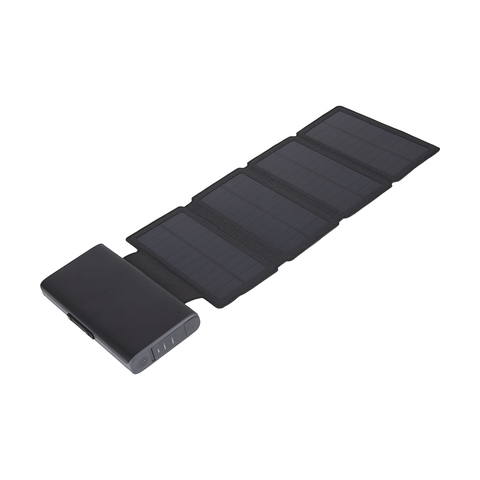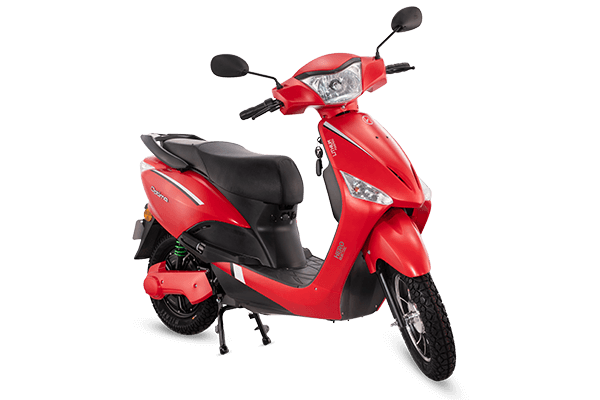In 2019 I attended the Yaama Ngunna Baaka Corroboree Festival in far western NSW. There were several hundred people camping out. Being a tech person, I took along a collection of solar panels, and power banks, to charge people's gadgets. What proved most useful were power-banks with attached fold-out solar panels. Kmart have one with an 8 Watt solar panel and 15000mAh battery for $55. There are higher power panels and batteries available, but then there is more to carry, and more cables to connect.
Saturday, November 27, 2021
Power for the outdoor office
Thursday, November 25, 2021
Getting a Company Director ID was Difficult Online But Not Impossible
The first step is to apply for a MyGovId. What I had not realized was that the MyGovId is not the MyGov service. MyGovId is an identity app on your Android or Apple smart phone, similar to the ones which supply codes for multi factor authentication. The app took a couple of minutes to download from the Android app store (from the Australian Taxation Office).
The app asked for an email address, name and a few other details. Then comes the tricky part: you have to use the app to scan identity documents. You hold you phone over the document, the app takes a photo and turns the data into text. My passport scanned fine, but the anti-counterfeiting features on my driver's licence meant some details did not transcribe correctly. I had to try three times, holding the card at an angle to catch the light right. It is important to have the scanned details match on each document.
Another problem was the phone repeatedly asking for a fingerprint-scan. At some point I was asked if biometrics should be turned on. I said yes, as this is a security app. But then each time the app was about to scan a document it would close and I would have to reopen it, then scan my finger again.
The last step was to take a photo of myself, to be checked against records. The result was not flattering, but acceptable to the algorithm. The MyGovID was then instantly issued.
Now I had a MyGovId, applying for a director ID was quick and simple. The most difficult part was working out that this is not done with the app. Instead you fill in a form on the ABRS website. Also the two factor authentication worked in the reverse way to what I was expecting. To identify myself, I had to transcribe a number from the ABRS web form, to the App on my phone, rather than from the phone to the web. With that done, I entered my personal tax file number, and some other details (less than I was expecting). This did not require scanning any documents, just typing the details in.
A step not required was to say what company I am a director of. All the details I had entered were about me: none about the company.
Thursday, October 28, 2021
Balance Mats for Special Effects, Military and Martial Arts Training?
 |
| Ian Bergman, MD, Balance Mat |
Sunday, October 24, 2021
Indian Electric Scooter with Dual Removable Batteries
Indian scooter maker Hero, is offering an electric scooter with dual batteries. As shown in a video review, here are two compartments under the seat to hold two batteries. The scooter can be operated with both batteries installed for maximum range, or one, while the other is removed for charging.
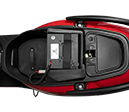 |
| Battery held in with velcro strap |
As the battery is a large investment, it would also be worth providing the option of using it to supply limited household power during a blackout.
ps: There are swap and go designs for interchangeable scooter batteries, such as Gogoro Network, but these all suffer from being proprietary systems.
Sunday, October 17, 2021
The Beijing Conspiracy by Adrian d'Hage
Adrian d'Hagé had a distinguished military career (our paths crossed at the Department of Defence), before writing six novels. This second one is a book for our times, featuring a COVID-19 like virus being used as a weapon.
Very much in the style of Tom Clancy, this novel involves conspiracies at the very top of the US Government, with honest hardworking military and intelligence personnel hampered by duplicitous self-serving politicians. However, in this case the characters are not quite so black and white, with some of the terrorists acting out of a sincere wish to improve conditions for their people, and business people acting more like terrorists.
With this sort of action adventure set in the present day, details are important and I have a quibble over one detail. In the novel the hero visits the impressive headquarters of the Beijing Olympic Games Committee. I spent almost a week there as a guest of BOCOG to provide some advice on the 2008 Olympics web site. As a recall it was an ordinary office building. The one unusual detail was a security guard in an immaculate uniform standing to ramrod attention in the foyer.
It is always a delight to found someone I know has written a book. In this case it is a relief to find it is a good book, and I will look out for others by Adrian d'Hage, just as soon as the official libraries open again.
Refurbished Dell Latitude E7270 for Learning with Linux
The E7270 is a sleek black rectangle, with plenty of ports (4 x USB, HDMI & Ethernet), an okay mat screen, back-lit keyboard and touch-pad. The case is apparently magnesium, but has a black rubber non-slip finish. This is the mid-to low end model, without the optional touchscreen, fingerprint scanner, or 4G modem (none of which I wanted anyway). The unit is supposed to be moderately rugged, with a spill proof keyboard (but not the track-pad buttons). This could be handy as I destroyed a previous laptop with a cup off coffee in the keyboard, and leaned on the case of one before that, cracking the screen.
I booted the machine and a fresh install of Microsoft Windows 10 came up, but all I used that for was to shrink the Windows partition, to make room for Linux. Dell sell laptops with Ubuntu installed, so I decided on that. One glitch was that with fractional scaling turned on Zoom became very, very, slow on Ubuntu.
However, I found Ubuntu's default desktop environment too different to the Mint Linux I had been using. So I first tried UKUI, to turn it into something more familiar (which looked familiar but did not work so well), before realizing I could simply install the same Mate desktop environment I had used to with Mint.
Buying a refurbished laptop worked out well. I could not browse in stores due to the COVID-19 lock-down, so had to rely on the reputation of the seller.My unit cost about one quarter the new price, refurbished by Australian Computer Traders, and purchased through Kogan. The package arrived on time, looked brand new (with a genuine Dell power supply) and worked straight out of the box. The laptop I got is about twice the speed of a new unit this price, but in a more premium case. Also it makes me feel good to be adding less e-waste to the world.
Friday, October 15, 2021
Digital COVID-19 Vaccination Certificate Online Proved Impossible
The recorded message at the start was curious, warning that threats would not be tolerated. That seemed an odd way to treat customers, with a greeting threatening them. But after one hour on hold, I can see how a caller could be irate by the time they get to an operator. As it was, after an hour I gave up.
I would be happy to deal with this matter some other way, but no other option is offered: it is by phone, or nothing. I suggest the system needs to be fixed to overcome this obvious fault.
Wednesday, September 22, 2021
New Generation of Underwater Drone Carrying Submarines Needed for Australia
 |
| Korean KSS-III Submarine (model) |
Larger UUVs (underwater drones) would be similar in concept to the Boeing Airpower Teaming System (Loyal Wingman). This is a pilot-less aircraft design to accompany aircraft with crews. It is being designed and built in partnership between US Boeing and the Australian Government. Boeing has the Orca Extra Large Unmanned Undersea Vehicle (XLUUV), based on the Echo Voyager. This is 16 m long with a range of 12,100 km. Smaller drones are more like very smart torpedoes and mines, with limited range. Small UUVs will have far smaller warheads than conventional torpedoes and mines, due to the need for more space for batteries or fuel. This necessity could be made a virtue, by providing a "less lethal" option in grey zone conflicts. UUVs could be programmed to disable a ship's propulsion, steering, or sensors, rather than sinking it. This would deny ports and shipping lanes to an enemy, with less risk of negative publicity from causalities, where the target was a warship disguised as a civilian vessel.
 |
| Event canvas from NWIW 2020 by Paul Telling |
Just as battleships were rendered obsolete after WWII by progress with aircraft at sea, large submarines will become increasingly vulnerable to UUVs. Some battleships were converted to aircraft carriers, and similarly submarines will become UUV carriers. This will allow submarines to remain at greater distances, just as aircraft carriers can launch attacks from over the horizon.
However, converted battleships did not make ideal aircraft carriers. Their heavy guns were obsolete and so removed. They did not have optimal storage for aircraft. Similarly, the design of submarines will need to change, with the priority being UUV storage, not sensors or torpedoes. A good starting point would be a design like the Korean Dosan Ahn Changho-class KSS-III. This is the only conventionally powered submarine with a Vertical Launch System for cruise and ballistic missiles.
.jpg/600px-USNS_Burlington_(T-EPF_10).jpg) |
| Austral Spearhead class expeditionary fast transport |
 |
| Deepsea Challenger |
However, the key part of UUVs would be in-country manufacturing capability. This could use local flexible manufacturing, such as Core Electronics factory at Newcastle, for assembling the computer controls, and composite construction from Acheron Project Pty Ltd of Sydney (as used for James Cameron's Deepsea Challenger).
Sunday, September 12, 2021
Wollies Direct to Boot Worked Better Than Coles but there is Room for Innovation
 |
| Woolworths Direct to Boot Bay, Tom Worthington CC-BY 12 September 2021 |
Saturday, September 11, 2021
My Phone Survived a Trip Through a Washing Machine
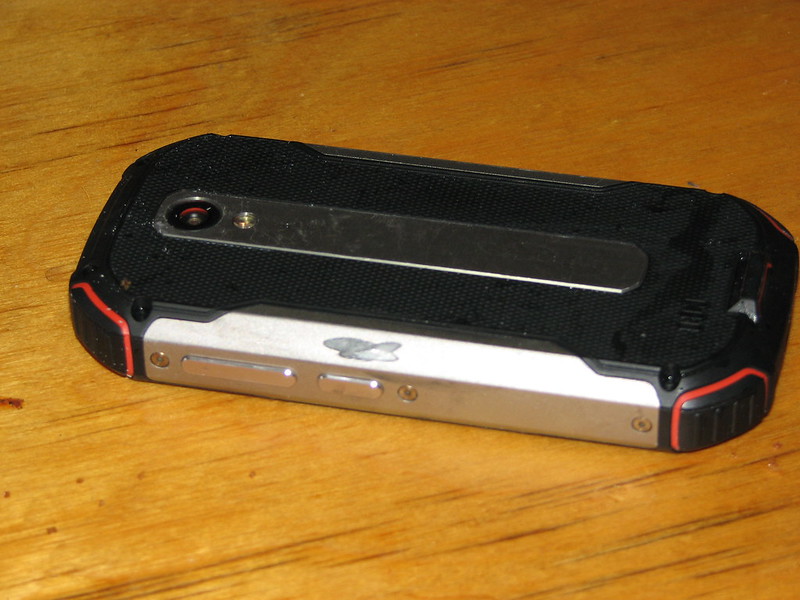 |
| Unihretz Atom L Smartphone case worn by washing machine |
 |
| Phone in a plastic box, with a fan and water absorbing sachets to dry out |
Thursday, September 09, 2021
The Wheels Fell Off My Virtual Shopping Trolley in the Pandemic
 |
| The Coles error screen. |
Who?
When?
Where?
How?
Where?
Goods?
Fluke?
Again
This time I did not even consider home delivery, and instead selected to-boot. Like Coles, there was a three day delay before I could collect. The time slots were one hour, rather than Coles' two. Also the deadline for changing my order before collection was a half hour shorter (five and a half hours, instead of Coles' six). This deadline is useful: you can add items to the order for days before collection, and keep your collection time booking. It is a few days to collection time and I will report how it goes then.
What Might Be Better?
Tuesday, August 31, 2021
Fixed my Digital Camera With a Bicycle Pump
At 6 megapixels, this camera is far lower resolution than my smart phone. But I normally have the phone set for 1 or 2 Megapixel photos anyway.
It is much easier to take a photo with a camera, such as this, which has a viewfinder you can hold up to your eye, than with a smart phone, or a digital camera with a screen on the back. The camera also has a screen which swivels out and around, so you can take a close up at an odd angle.
The only problem was the camera would switch off every time I zoomed the lens out to the full extent. A web search sowed this was a very common problem. Suggestions ranged from the, not very useful "It appears a fault, you need to have it repaired", to the complicated "Here is how to disassemble the camera". One tip was that there could be dust on the switch which detects when the zoom is fully extended.
One video showed blasting the lens with an air-compressor. That seemed a little extreme, especially when the whole camera is shown sliding along from the air pressure. My own little air compressor, had no effect. But I found a bicycle pump, with the adapter for inflating an airbed worked fine. I extended the camera lens, and placed the nozzle between the lens and camera body, working all the way around, blowing in air. The zoom now works fine.
Saturday, August 28, 2021
Australia Needs Self-serve Quarantine Centers
Purpose built Quarantine Centers are being constructed in Australia. I suggest that these be, in the main, low tech, self serve facilities. This will increase the speed with which they can be built, lower the cost of construction and operation, provide lower risk of disease transmission, and be better for the welfare of the guests.
The Building 4.0 Cooperative Research Centre, has submitted an unsolicited high tech "Q_Smart" design for the Victorian quarantine center. This has some good ideas, but is more high tech than needed, The designers have shown a multi-story design, suited to limited land next to airports, as well as single story ones, where space allows. The designers criticize the current "conventional bricks and mortar, or mining camp, approach". However, I suggest this is misplaced. Rapid construction is a priority, and the prefabricated techniques used for mining camps are appropriate. Also mining camp accommodation must be robust, as it is intensively used, by a rapid turnover of guests, which also applies in a quarantine center.
The use of high technology solutions is not a good approach for a quarantine center which is to be constructed rapidly and have only a limited lifetime. As an example, the airlocks, and UV light sterilization suggested for Q_Smart are not be needed, if there is sufficient space and natural ventilation. Touch-less entry to buildings will also not be needed, if guests each have their own door to their accommodation. The guest will be the only one to touch their door during their stay, and it will be cleaned by staff when vacated.
 |
Laurus Wing of ANU Ursula Hall under construction. Photo by Tom Worthington CC BY 2009 |
The Q_Smart designers suggest stack-able building modules, built in a factory. This approach is already in use for buildings made in shipping container modules, such as ANU Ursula Hall (2009). However, this approach requires more expensive construction techniques, than if buildings are single story, and where a flatpack approach can be taken. I a multistory building is needed, then pre-cut structural panels, as applied at ANU Fenner Hall, can be used.
Also while stairs can be quickly built, lifts require complex installation and maintenance by specialists. If a multi-story building is required, it can be built with an external open air stairway, and no lifts, but with ground floor accommodation reserved for those with limited mobility, as is the case for City Edge Canberra.
The designers suggest delivery of good direct to rooms, via dumb waiters. However, simple manual and electric dumb waiters, essentially smalls goods elevators, can only travel vertically. There would need to be one such waiter for each building. With a shaft connecting every apartment, this would pose a major cross-contamination risk. A far safer, simpler approach would be to provide guests with enough supplies of sheets, towels, personal hygiene products, and non-perishable food, for the duration of their stay, so there would be no need for regular deliveries. For occasional deliveries a simple, safe, low tech approach would be to place the delivery outside the guest's door, and then invite them to open the door a few minutes later, after any aerosols have dispersed in the open air.
While Q_Smart suggests the use of the Internet of Things, with smart devices deployed around the center for monitoring of systems and the guests, I suggest relying on the guests own smart phones. Just as QR codes have proved a success for checking people into venues, these can be used, with the gusts own phones, for monitoring movement in the center. This requires only low cost QR code signs, not a computerized network requiring installation and maintenance.
Tuesday, August 17, 2021
Canberrans Queuing Around the Block for a COVID-19 Test
 |
| COVID-19 Testing Queue in Canberra, by Tom Worthington CC BY 17 August 2021 |
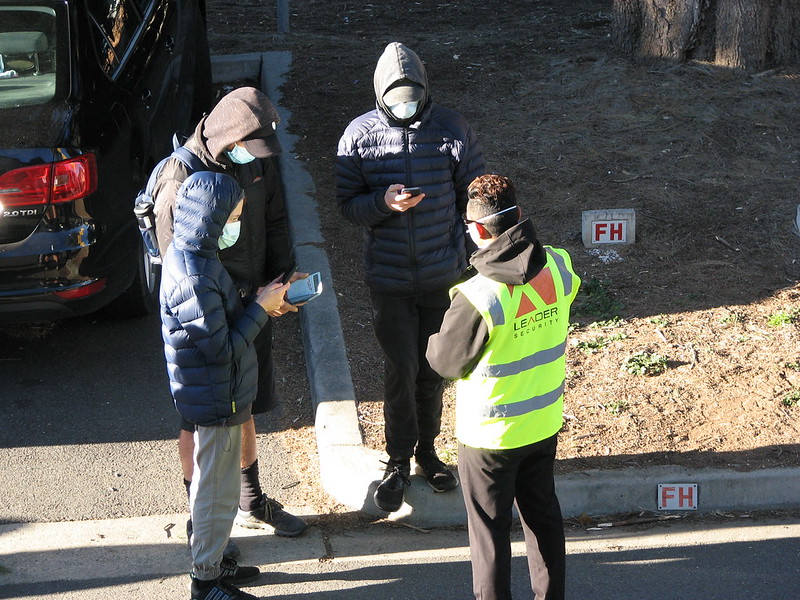 |
| COVID-19 Marshall at Testing Queue in Canberra, by Tom Worthington CC BY 17 August 2021 |
Monday, August 09, 2021
Vaccinated at Clinic on the Edge for Many Possible Futures
We have had it easy so far, so get vaccinated now, in case things get worse, a lot worse
It is also possible the Australian Defence Force may be needed in its primary role and so personnel would not be available to aid the civil infrastructure. Also some civilian medical personnel and other specialists are military reserve personnel who would be called to duty, so not available for for pandemic duties.
Monday, July 26, 2021
The digital Estonian
Greetings from the ANU where Ms Kersti Eesmaa, the Estonian Ambassador is giving an entertaining talk on how her country became the most digital. This includes e-voting, e-tax, e-health and just about e-verything. They have backed up the country's records in Luxembourg and are considering Canberra. The ambassador complemented Australia's online services but suggested it was tie for one national ID At qesttion time I asked about e-residency and the ambassador asked when I would drop in to get my card.
Thursday, July 15, 2021
Provide Online Informed Consent for COVID-19 Vaccination
The ABS reports that only 73% of Australians would get a COVID-19 vaccination. Of the others, 52% were worried about side-effects and 15% effectiveness. In response, I suggest that Australia's National Cabinet approve the use of online informed consent using multimedia in multiple languages, to streamline COVID-19 vaccination, using any of the vaccines approved for use in Australia for any adult of any age.
The Australian Technical Advisory Group on Immunisation (ATAGI) has advised:
"... AstraZeneca vaccine can be used in adults aged under 60 years where the benefits clearly outweigh the risk for that individual and the person has made an informed decision based on an understanding of the risks and benefits".
And
"Noting the current constrained supply of the Pfizer vaccine, ATAGI also recommends adults under the age of 60 who do not have immediate access to the Pfizer vaccine should consider the benefits and risks of earlier protection through the AstraZeneca vaccine. "
However, that advice has been implemented in a way which makes it very difficult for anyone who does not have a GP with supplies of AstraZeneca, from being vaccinated.
The Australian Government provides a document "Weighing up the potential benefits against risk of harm from COVID-19 Vaccine AstraZeneca" to assist with informed consent. But, this is intended for doctors to help explain to patients. As a result those who don't have a GP to explain it to them cannot give informed consent and so cannot be vaccinated at mass vaccination center.
I suggest National Cabinet decide that a standard audio-visual package in multiple languages be prepared. This would be added to online booking systems, allowing any adult to give informed consent to an AstraZeneca vaccination online. Any adult should be able to walk into any vaccination center at the booked time, show ID and be vaccinated immediately, without the need to speak to anyone, or fill in any paperwork.
Individuals would still have to option to visit their doctor to discuss vaccination. However, I suggest our leaders now need to ask every Australian to accept that the risk, in the interests of their family and the community to get vaccinated now.
Saturday, July 03, 2021
Make Getting a Vaccination Should be as Easy as Ordering a Pizza
It is more than a year since the beginning of the COVID-19 pandemic emergency in Australia. Federal and state governments have spent billions of dollars on health measures, but are still unable to field an easy to use online vaccination booking system. I suggest modelling this on the ease of use, and sophistication, of a pizza ordering system. Some years ago I ordered a pizza online for collection. The system took my details and presented pizza options. It then listed the nearest places I could collect it. What was impressive was the system then asked my means of transport and estimated when I should leave to get there just in time. I left at the time suggested, and as I walked through the door of the pizza parlor, my order popped on an electronic display indicating it was ready. I picked it up and was out the door in under a minute. It should be possible to do something similar for vaccinations.
A responsive online vaccination booking system would instill confidence in the public and increase the efficiency and safety of the vaccination process. Removing long queues at vaccination centers will decrease staffing to manage the crowd and also reduce the risk of spread of infection. All of the information the patient needs should be able to collected online and them arrive with a QR code ready to be scanned and jabbed.
An efficient online vaccination system could prevent tens of thousands of deaths, by speeding up vaccination and preventing mass breakouts of COVID-19. This could also decrease the risk of mental illness and death, due to the suffering brought about by lock-downs and unemployment, particularly of younger people. This places such systems in the category of "safety critical", requiring a higher level of care in design, testing and deployment by computer professionals.
Improved ACT Health COVID-19 Vaccination Booking System
Medicare Number Format
A problem still exists with the way the patient has to enter the Medicare number on the ACT Government system. This differs from the format used by Federal Government and private providers. It will only be a problem the first time the patient registers with the system. For someone who will regularly attend a clinic for medical treatments, that is not a major problem. But for an emergency vaccination campaign, where each patient will attend only two or three times, difficulties in initially registering are more significant.
Registration
The ACT Government page on vaccinations has a link for patients to register. However, that link doesn't take the patient to the registration screen, but to the login screen. The patient is then asked for their user ID and password they have not yet been issued with, which is confusing. There is a link for registering, but patients are may be confused at this point and never see the link.
Once the link is found, registering is not too complex. The patient is asked to enter a code sent by email or SMS. This is described as a "one time security code". If this process only applies during signup it is not clear how this authenticates the person, as neither the email address or telephone number have been separately authenticated (unless perhaps this information is obtained from Medicare).Secure Username?
 |
| MyDHR Choose User name, ACT Health, 3 July 2021 |
MyDHR Main Screen
 | |
|
 |
| MyDHR Vaccine Eligibility, ACT Health, 3 July 2021 |
No Medical Records on System
The ACT Government system is intended to provide a comprehensive system for patients of ACT Health, not just vaccinations. So I looked to see what records were recorded. There was not record of my ever being a patient, although I had spent a night in the ICU and received numerous tests. It may be my treatment was too long ago to be worth loading into the new system, but patients will not feel reassured about receiving further treatment, if there is no record of their previous treatment.
Confusing Email
After registering, I received an email with the subject line "Please check your MyDHR account". However, the body of the message said "... you have new information in MyChart.". But what is MyChart? There was no signature block to indicate this message was from the ACT Government, and no contact details to reassure the patient this was a genuine message and help the patient seek further information (the message had a "no reply" address).
Wednesday, May 26, 2021
Help Provide Australian Oxygen Concentrators to COVID-19 Patients in India
Ambarish Natu, a senior and respected member of the computing profession in Australia, is raising funds to provide Australian oxygen concentrators to COVID-19 patients in India. You can contribute to the campaign now.
Sunday, May 23, 2021
What your boss really knows about your internet usage
 |
| West Live Podcast |
"It turns out your boss can see much more than you think when it comes to your internet usage at work, no matter how incognito you get.
Australian National University honorary lecturer and technology consultant Tom Worthington knows a thing or two about what you can and can’t get away with at work when it comes using the web."
Monday, May 17, 2021
Why Are the Federal & ACT COVID-19 Vaccination Booking Websites So Difficult to Use?
 |
| WHO Digital Vaccination Certificate |
Below I detail some changes, and why they are needed. Australia's vaccination rate is currently far below that needed to have everyone eligible offered at least one dose buy the end of the year. There are obvious flaws in the federal and ACT vaccination websites, including incorrect, and misleading formation. By making it harder for the public to get vaccinated, are placing lives, and the economy, at risk. It is suggested changing the government sites to make it easier for the bulk of the population to book a vaccination. It would also be useful to offer something tangible, such as a vaccination certificate, with a QR code.
Suggested Changes
1. Booking Link at Top of Page: Both federal and ACT governments should have a line at the top of their main COVID-19 web pages for booking:
- Fifty or over? Book your COVID-19 vaccination now: 50+ Book!
2. Show online booking sites first: The federal government page should display vaccination centers which have online booking first. Public high capacity clinics should be displayed first, followed by GP clinics, and GPs last.
Finding Where to Get Vaccinated
A web search using Google for "covid19 vaccine booking", has as the first four responses:
- COVID-19 Vaccine Booking - Book An Appointment (Ad) https://www.health.gov.au/
- COVID-19 vaccinations - Available now in Canberra (Ad) https://www.nhc.coop/
- How will I get my COVID-19 vaccine? | Australian Government ...www.health.gov.au
- Booking your COVID-19 vaccination - COVID-19 - ACT Health www.covid19.act.gov.au
The first two of these are paid advertisements and the next two native responses. The first is to the federal health website, the next a private clinic in Canberra, then a different Federal Government page and lastly the ACT Government. That there are two different federal government pages resulting from the one search is confusing.
Federal Health Website
The first Federal Government page says "... book an appointment if you are eligible ...", but this is below the fold, below the first screen of information, in the middle of a sentence and thus very difficult to see.
 |
The priority in the design of this page appears to be to educate the public as to who is eligible, so as not to overload the system. With the decision to permit all over 50s to book, I suggest this is misplaced. The priority should be on getting people vaccinated and saying "book vaccination".
After three screens the federal system displays the nearest vaccination centers. Here they are for O'Connor, ACT:
 |
| Vaccination centers suggested for O'Connor ACT. |
The screen is headed with "Please use online appointments where available to reduce call volumes to clinics. If you can’t find an appointment or a clinic in your location, please check back in a week.". However, four of the five entries displays are for phone bookings only. Following the instructions given, the user would select the one and only clinic which takes online bookings.
The only entry which has a link for online booking is to the ACT Government clinic. However, this only accepts online booking from previous patents of ACT Heath (and I was unable to make a booking even though I had been a patient).
National Health Co-op
National Health Co-op is a non-government, not-for-profit health service. The web link leads to a vaccinations page, with two buttons, for "Covid 19" and "Flu Shot". This then shows the six locations where a shot can be booked. The details of how to registered and book are left until later.
National Health Co-op COVID-19 Booking details
This is a good design, the user gets to see where they could go, without having to enter a lot of personal details first. However, the information presented contradicts that on the Federal Health web site. The Federal site lists the Co-op's ANU clinic as available for phone bookings only. That clinic is not listed by the Co-op's website and all of those listed can be booked online. It appears the Federal government site is incorrect, listing a clinic which is not available and also not listing those which are.
Second Federal Government Web Page
The second federal government page to appear in the web search results is "How will I get my COVID-19 vaccine?". This has a link for "Book or register for COVID-19 vaccination", but below the fold, so the user has to scroll down to find it. This then links to the COVID-19 Vaccine Eligibility Checker, discussed above. Again the booking link is not prominent, and the page does not appear to be designed to have vaccination booking as a priority.
 |
| Federal how will I get my vaccine page. |
This is not a good design, as the link for booking a vaccination is not prominent.
ACT Health
The ACT Health Booking your COVID-19 vaccination page, has the link "How to book your COVID-19 vaccination" above the fold.
 |
| ACT clinics map |
However, only one of three of the clinics shown are for the general public. As a result showing a map is misleading, not useful. The one clinic shown requires online booking via the ACT Government booking system "MyDHR". This system requires entry of the Medicare number in a format different to that used by the federal government and private providers, and the number is not displayed as it is entered. Also online registration is only available to those who are already patients in the ACT health system (and in some chases even not then).
"Hi, if you have any technical issues when using MyDHR, please call 02 5124 5000 (24 hours a day, 7 days a week). Please refer to our FAQ 'I'm having issues signing up to MyDHR' for other reasons you may be having issues"
